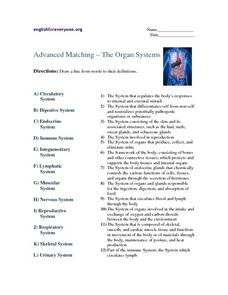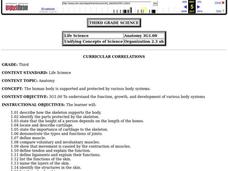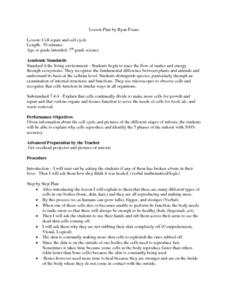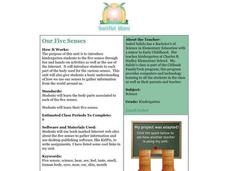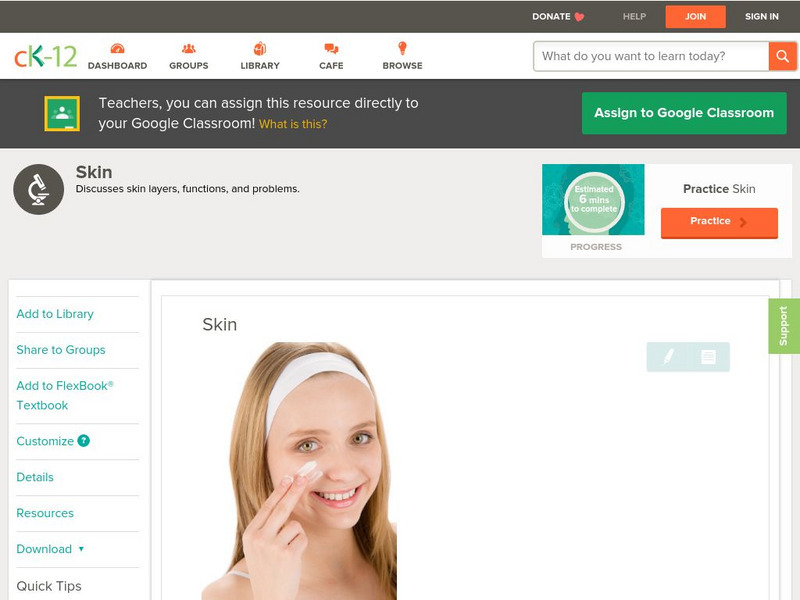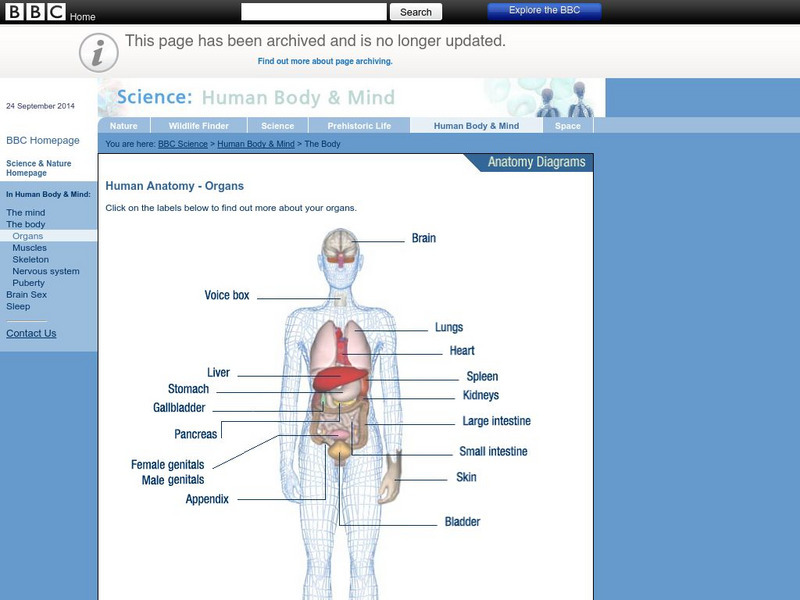Curated OER
The Human Body
In this human body activity, learners will review the characteristics of the body systems: skeletal, circulatory, muscular, digestive, urinary, endocrine, reproductive, lymphatic, and respiratory systems. This activity has 12 fill in the...
Curated OER
Amphibians and Reptiles
Compare and contrast reptiles and amphibians using a reading guide handout. Although it is designed to accompany a particular textbook, most reading or video selections covering these types of animals will go over the same facts. If you...
Curated OER
Advanced Matching - The Organ Systems
What's the difference between the digestive system and the endocrine system? Explore 12 body systems in this anatomy matching worksheet, for which learners find descriptions corresponding to anatomical terminology. Some of the...
Curated OER
Skeletal System
Third graders describe and identify the parts of the skeleton and how they support the body. They observe two chicken bones that have been soaked in vinegar for 5 - 7 days. They observe the bone's appearance after it has been removed...
Curated OER
Microviewer
In this microviewer activity, students observe several types of cells. Students draw each type of cell and label the important parts. Students also answer questions relatable to the cell and the purpose for study.
Curated OER
Cell Repair and Cell Cycle
Seventh graders explore the cell cycle. They view pictures of different stages of mitosis and explain why cells reproduce. They identify the five phases of mitosis: interphase, prophase, metaphase, anaphase, and telophase.
Curated OER
Our Five Senses
Pupils explore the five senses through hands-on and Internet activities.
Curated OER
Animal Adaptations
students in groups to work on bulletin board, making a list of animal adaptations. They write an example of each body covering and find pictures of animals with these coverings. They mount pictures and label the covering. They should be...
Curated OER
Tissue Types
In this human tissue worksheet, students read about the 4 different tissue types in the body. Students read 4 pages about the types.
Curated OER
The Human Body
Learners research information about the human body. They read books and explore the Internet to gather information about the human body. Students create graphic representations and models of the body systems. Working in groups, they...
Curated OER
Diversity And Adaptations Of Organisms
Seventh graders demonstrate the processes of science by posing questions and investigating phenomena through language, methods and instruments of science. They study the body features or systems of several animals.
Curated OER
How Do Cells Reproduce?
Learners discuss the importance of reproduction of cells. They identify and describe the stages of Mitosis. They discover what happens to chromosomes and DNA during reproduction.
Curated OER
Periodic Table & Its Trends-Day 1
Learners are introduced to the periodic table. They find the common trends among the electron configurations and the names of certain groups of the table. Students explore the atomic mass, atomic number, mass number, mass and charge...
The Association of the British Pharmaceutical Industry
Abpi: Skin Structure and Function
An interactive, self-paced lesson on the body's largest organ, the skin. Students learn information and watch descriptive animations to aid in understanding, answering review questions throughout the activity. A self-check quiz follows...
CK-12 Foundation
Ck 12: Episd: Skin
[Free Registration/Login may be required to access all resource tools.] Find out the structure and function of skin and identify common skin problems.
Mocomi & Anibrain Digital Technologies
Mocomi: Structure and Function of the Skin
Defines skin and its layers and also provides other interesting facts.
Curated OER
Kids Health: The Whole Story on Skin
This website offers a simple, yet detailed explanation on the structure and function of skin.
CK-12 Foundation
Ck 12: Life Science: 11.3 Skin
Understand the structure and function of the human skin.
Other
Net Wellness: Skin Care
Contains information about the following: how the skin functions, skin structure, the epidermis, the stratum corneum, the middle epidermis, the basal layer, epidermal cell summary, the dermis, aging and its effects on the skin, natural...
CK-12 Foundation
Ck 12: Fourth Grade Science: Life Science: Skin
[Free Registration/Login may be required to access all resource tools.] Describes the layers and functions of the skin, and explains what you can do to help keep your skin healthy.
CK-12 Foundation
Ck 12: Life Science: Skin
[Free Registration/Login may be required to access all resource tools.] Did you know that you see the largest organ in your body every day? You wash it, dry it, cover it up to stay warm, and uncover it to cool off. Yes, your skin is your...
Open Curriculum
Open Curriculum: Integumentary System
With this article, students will be able to identify the structures that make up the integumentary system, their functions, and health conditions that may affect parts of the system.
BBC
Bbc: Human Anatomy: Organs
Explore the anatomy of the human body. Click on an organ or other body part to read more about its structure and function, and then try out an interactive activity for that organ.
PBS
Pbs: The Clickable Croc
This informative site examines the role of the key parts of the crocodile. It specifically looks at the structure and function of the teeth, feet, tail, nostrils, skin, stomach, eyes, ears, and throat.


